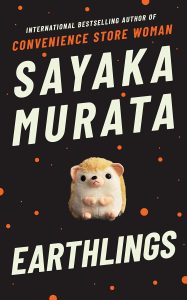Reviewed by Riley Conlon

Earthlings, the second novel by critically acclaimed Japanese author Sayaka Murata is a societal take down masquerading as a coming of age story, equal parts ET and The Shining. The novel comes across as an unassuming young adult novel yet, hidden beneath the books cutesy cover and charming premise is a grotesque whirlwind of incest, rape, murder, and cannibalism. 11 year old Natsuke, our first person narrator and protagonist, exists on the fringes of her traditional conservative Japanese family. She is emotionally distant, her sole comfort a cuddly plush hedgehog named Piyutt who serves as a much needed distraction from Natsuki’s rigid and humdrum existence at home. When the novel begins Natsuki and her family are en route to her grandparents house located high atop the Akishina mountains. The trip is a yearly tradition, a massive, weeks-long family gathering in celebration of the summer Obon festival, as well as Natsuki’s favorite time of the year. During the gathering Natsuki is reunited with her cousin Yuu, a boy of her age who understands her far more than anyone else in her family. As the black sheep of the family the cousins form a tight knit bond, strengthened by their wondrous, or, depending on how you read it, outlandish worldview. Natsuki believes that Piyutt, her lovable companion, is actually an alien emissary from the distant planet of Popobopia on a mission to save the earth. Yuu also believes in aliens, so deeply in fact, that he assumes he is one himself, left behind by mistake while his real family roams the galaxy. The pair are clearly desperate for an escape from familial pressures, the novel is never really subtle with it’s metaphors but this stand-in of aliens for literal alienation is one of the more on the nose bits.
As the summer ends, Natsuki returns home forced back into the confines of routine, forced to confront real life with no spaceships to whisk her away. A return home also means a return to school, a plot point that begins the novel’s extreme narrative left turn. Natsuki is repeatedly molested by her teacher who preys on the preteens’ disconnect from the world around her. Seeking safety in the arms of her mother she finds only more pain as she is beaten for her overactive and “filthy” mind which only forces her to disassociate even further. Gone are the fantastical, childlike joys of the book’s first chapter, as Natsuki loses her innocence so too does the audience. Murata writes this scene, like the other more graphic sections of the novel, bluntly and in extreme detail. She paints an ugly world with her writing, one that is particularly wicked towards women, the perfect catalyst for her protagonist’s explosive escapism.
Fast forward several years and we find Natsuki at 36, deeply entrenched in her Popoboian delusions. At this point she has fully convinced herself of her alien destiny, a tool she wields fiercely in order to avoid her family’s as well as her culture’s demanding gender roles. Natsuki views traditional Japanese culture here as a “factory” which serves only to churn out more of the titular “earthlings”, people who have accepted their positions as functioning members of society. Becoming a wife and mother, caving to societal norms, would only serve to make Natsuki a cog in the proverbial machine, effectively shattering the carefully crafted fantasy world she has built around herself, the only thing protecting her from the horrors she endured as a child. Murata has been critical of conformity and gender roles before in her fledgling novel Convenience Store Woman, but if she was whispering then, she’s screaming now. There is no romanticizing the metaphor here as Murata consistently beats the reader over the head with her hatred of societal constraints. Natsuki, desperate to satiate her parents cultural desires, ultimately marries Tomoya, a like minded free thinker who also wishes to escape his familial pressure. The pair are purely platonic, sharing a home yet separate bedrooms; a relationship based solely on convenience. Tomoya, eager for purpose and direction, immediately buys into Natsuki’s alien delusions, fully embracing her Popobopian counter culture lifestyle. Yearning for someplace to escape the factory, the couple retreats to the only place that Natsuki ever felt at home, her grandmother’s house in the mountains.
It is here where our protagonist reunites with her cousin, who has also abandoned the real world in favor of his self proclaimed alien heritage. Far from the constraints of traditional society, the trio quickly devolve into animals, existing in a vacuum without morals or boundaries. The novel takes a sharp downturn here as the characters commit increasingly heinous and vile actions in order to further themselves from the earthlings down below. Muratas darkly cynical view of the world is on display here but the lines of her message are extremely blurred; much of the novel screams at the reader that conformity is the antithesis of happiness and yet, without said conformity, the characters commit grotesque atrocities rivaling any imaginable horrors. There is no middle ground in Murata’s black and white world; you either accept conformity and lose your soul, or reject conformity and lose your humanity. Readers who initially picked up Earthlings for its promise of an extraterrestrial coming of age story may be put off by the novels excessively graphic violence and lack of subtlety in its mature themes. Those who make it all the way through however, will find themselves on the other side having experienced a darkly witty and satirical take down of traditional societal roles. We may not be happy conforming but at least we’re safe, and if “normal” isn’t your speed, there is always room on the spaceship, just be careful what you wish for.
